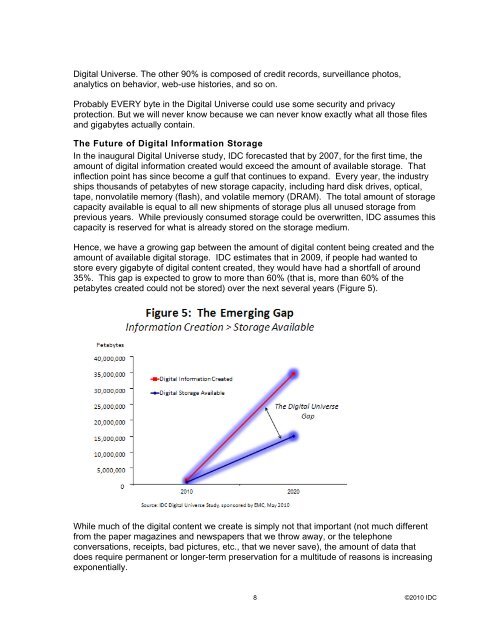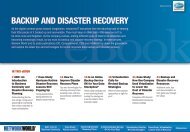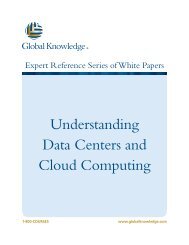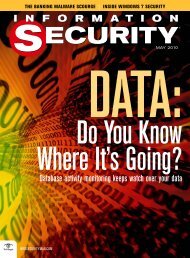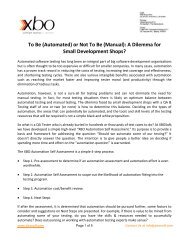<strong>Digital</strong> <strong>Universe</strong>. The other 90% is composed of credit records, surveillance photos,analytics on behavior, web-use histories, and so on.Probably EVERY byte in the <strong>Digital</strong> <strong>Universe</strong> could use some security and privacyprotection. But we will never know because we can never know exactly what all those filesand gigabytes actually contain.The Future of <strong>Digital</strong> Information StorageIn the inaugural <strong>Digital</strong> <strong>Universe</strong> study, IDC forecasted that by 2007, for the first time, theamount of digital information created would exceed the amount of available storage. Thatinflection point has since become a gulf that continues to expand. Every year, the industryships thousands of petabytes of new storage capacity, including hard disk drives, optical,tape, nonvolatile memory (flash), and volatile memory (DRAM). The total amount of storagecapacity available is equal to all new shipments of storage plus all unused storage fromprevious years. While previously consumed storage could be overwritten, IDC assumes thiscapacity is reserved for what is already stored on the storage medium.Hence, we have a growing gap between the amount of digital content being created and theamount of available digital storage. IDC estimates that in 2009, if people had wanted tostore every gigabyte of digital content created, they would have had a shortfall of around35%. This gap is expected to grow to more than 60% (that is, more than 60% of thepetabytes created could not be stored) over the next several years (Figure 5).While much of the digital content we create is simply not that important (not much differentfrom the paper magazines and newspapers that we throw away, or the telephoneconversations, receipts, bad pictures, etc., that we never save), the amount of data thatdoes require permanent or longer-term preservation for a multitude of reasons is increasingexponentially.8©2010 IDC
But as we peer into the future, we see the greatest challenges are related not to how tostore the information we want to keep, but rather to:Reducing the cost to store all of this contentReducing the risk (and even greater cost) of losing all of this contentExtracting all of the value out of the content that we saveIDC data shows that nearly 75% of our digital world is a copy – in other words, only 25% isunique. Granted, various laws and regulations require multiple copies exist in order toensure the availability of data over a long period of time. Multiple copies of data are alsonecessary to ensure proper performance by applications, or to protect data in the event ofhardware failures. Nevertheless, the amount of data redundancy is excessive in manycases, and it represents a prime area for improvement and cost reduction.Most of today’s de-duplication happens on 2 nd tier storage, but it doesn’t have to.Tomorrow’s opportunity is for de-duplication on primary storage (assuming no impact toperformance), which would significantly reduce or eliminate post-process de-duplication.The cloud is an especially attractive place to eliminate redundancy, given its one-to-manymodel of content aggregation.IDC’s forecast portends a huge amount of consumer-attached storage, either directly tohosts or via a network. The external drive market will continue to experience considerablegrowth. Hence, there is a growing need to enable storage management by consumers. Ascomputing races down the mobility path, one person may find himself with multiplecomputing devices (each potentially with its own operating system), and various amounts oflocal storage, all of them providing similar ways to access the cloud (via wireless cellular orwireless broadband).Sharing the same content among these devices will increase in importance. The cloud mustplay a strategic role in becoming the central axis for all of this content – yet there is muchwork to do in order to make this happen. Until then, individuals will strive to keeppasswords, content, and services mapped appropriately among their digital device portfolio.Personalized services (e.g., GPS, proactive coupon pushing, e-commerce) will grow inimportance as more data about one’s personal habits and preferences is captured andmined by sophisticated applications. Granted, many people today may find this to beintrusive or a direct violation of their personal privacy. But as newer generations of teensand adults use their beloved digital devices, various types of data will be captured andleveraged to deliver services that not only will be embraced, but also will be considered oneof those can’t-get-along-without-it technologies. The personal data captured and used todeliver these services must be tied to an individual anonymously, and it must be managed inaccordance with strict governance and compliance procedures in order to ensure thatprivacy is not breached. This is, as they say, “easier said than done.” Nevertheless, it mustbe done.Personal privacy is paramount, and although there are behaviors one can employ to lessenone’s digital footprint, no one can completely disappear off the ubiquitous digital grid. Videosurveillance and purchasing transactions will be nearly impossible to avoid, and interactionin social networks will be either commonplace or a temptation that is difficult to overcome.©2010 IDC 9


